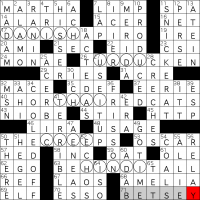meta 0:30
 hello and welcome to episode #550 of matt gaffney’s weekly crossword contest, “Tongue-Tied”. quick blog post this week, as i haven’t left myself much time and i’m in a rush. for this week 2 puzzle, matt challenges us to name a language. what are the theme answers? there are five medium-long acrosses:
hello and welcome to episode #550 of matt gaffney’s weekly crossword contest, “Tongue-Tied”. quick blog post this week, as i haven’t left myself much time and i’m in a rush. for this week 2 puzzle, matt challenges us to name a language. what are the theme answers? there are five medium-long acrosses:
- {Author of the bestselling memoirs “Hourglass” and “Slow Motion”} DANI SHAPIRO. unfamiliar with this author, but she has a terribly useful first name that we don’t see in crosswords … yet. she seems to be pretty noteworthy, so maybe we’ll see this name more. apparently it used to be short for danielle but she legally changed her name to DANI in 2017.
- {November Frankenfood} TURDUCKEN.
- {Egyptian Mau and Japanese Bobtail, for two} SHORT-HAIRED CATS.
- {Skeezed out feeling} THE CREEPS. i like this answer.
- {Calling the shots} BEHIND IT ALL. i don’t love this one; feels kinda roll-your-own.
anyway, each of those phrases contains the name of a foreign language hidden in it. that was quite evident from the start as i was attempting to pierce together DANI SHAPIRO and saw that it started with DANISH. the others are URDU, THAI, CREE, and HINDI (mutually intelligible with URDU, did you know that?), and taking the first letters of these languages in order gives DUTCH, another language and the meta answer.
this meta mechanism feels quite familiar (perhaps even {Tending to give one the willies} EERIE-ly so), but i can’t immediately locate the puzzle it’s reminding me of. at any rate, it wasn’t difficult and i thought the mix of languages was nice.
in the fill, i enjoyed FRISSON and GO TIME. i didn’t love {“Finish that container, we have more”} USE IT UP or CDEF, although the former may have been necessary as it crossed three theme answers (TERRIBLE and PRODUCED too, but those are fine). i was surprised to see the pixar heroine MERIDA clued as {Largest city on the Yucatan Peninsula}, a city i’ve never heard of.
that’s all i’ve got this week. how’d you like this one?
Easy enough Meta but did anyone else have the Natick at the “End of Ramadan” and “City I’ve never heard of” crossing? If you don’t know either, you can probably assume its a vowel but seems like they all pretty much work equally well (Merada/Ead, Mereda/Eed, Merida/Eod, and Meruda/Eud). I landed on Meruda. Oh well.
I wouldn’t be surprised if this was a Natick for lots of people, though imo EID should be in crosswords all the time, since it’s a major holiday of a religion practised by almost 2 billion people. It’s interesting that it’s never been used in the NYT.
Seriously — never? It seems impossible a word that useful could be avoided except by intentional exclusion.
I wouldn’t say intentional exclusion. Will probably thinks it’s not in common use. EID actually isn’t just the “End of Ramadan” as clued. It means a religious festival – there’s Eid al-Adha, Eid al-Fitr, etc. Billions of people celebrate these holidays, so perhaps English-speakers should learn this word.
I also think it’s interesting that Natick became the term for an unusually difficult crossing. The town’s name isn’t at all unusual to me. I lived in the Boston area for fifteen years, and drove through Natick often.
I mean, my son gets Eid al-Fitr off from his New York City public school. If TET can be clued as a festival, I don’t see why EID should be deemed less known.
My disapproval of the name of the term is from the crossing in that historical puzzle. How can reasonably literate people anywhere in the English-speaking world not be familiar with renowned and prolific illustrator NC Wyeth? Published in hundreds of thousands of editions, if not millions. Father and grandfather, respectively, to noted artists Andrew and Jamie Wyeth?
That’s certainly a vaster swath than those living in the Boston area, or New England, or the US northeast.
Obviously I won’t let go of this.
“I wouldn’t say intentional exclusion. Will probably thinks it’s not in common use.”
If a puzzle with EID comes across Will’s desk and he decides to edit EID out of the puzzle, that’s the definition of intentional exclusion. Of course, it’s (sadly) possible that nobody’s put it in a puzzle yet, in which case the issue lies elsewhere.
I included EID in a grid that was recently accepted by the NYT. The acceptance e-mail didn’t say anything about EID, and it would be difficult to edit out, so I’m hopeful it’ll stay.
One thing I’m not clear on after admittedly only cursory research — is EID essentially a partial, or is it commonly used outside of the full holiday names?
One thing I liked about this one is that out of the five hidden languages, only one ended in “-ish”.